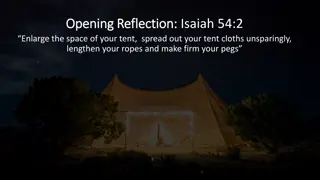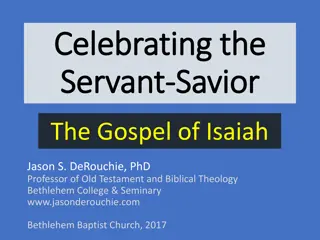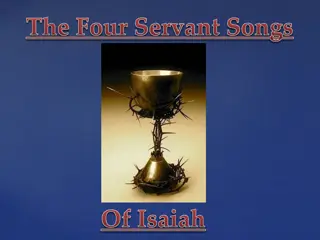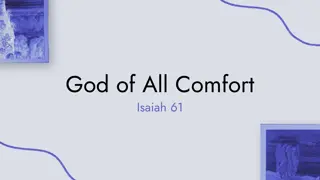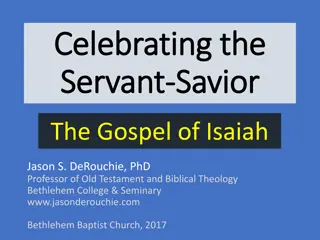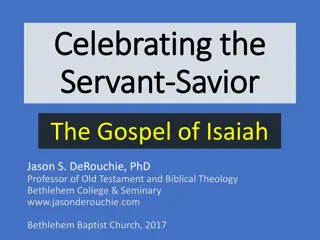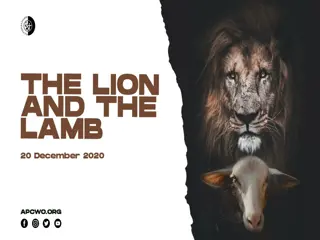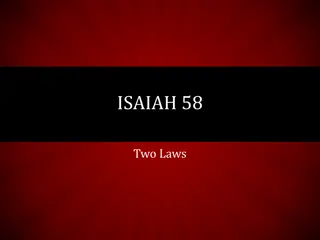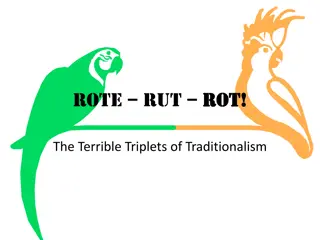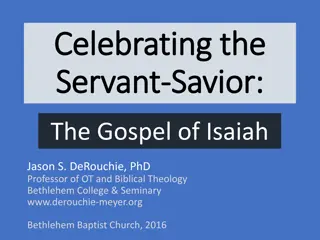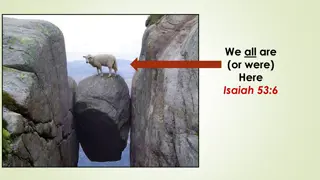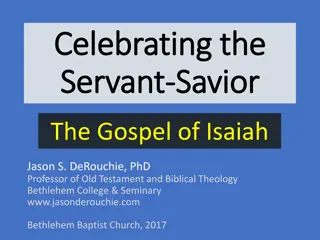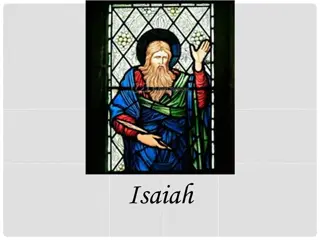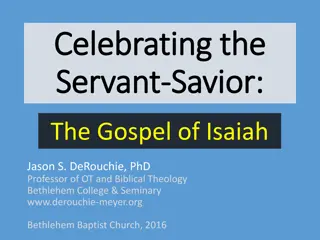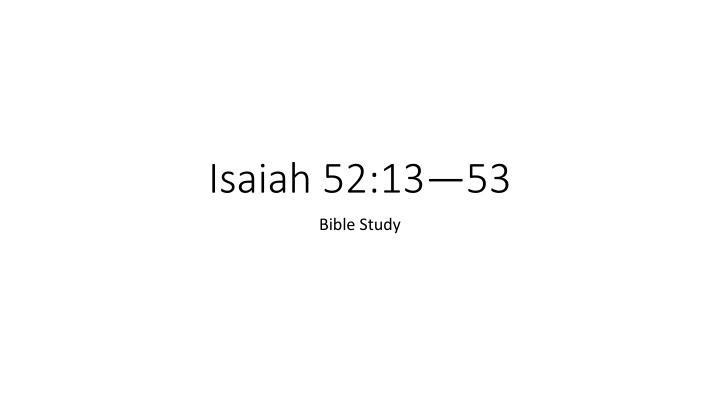
Prophecies of Messiah's Sufferings and Salvation in Isaiah
Explore the profound prophecies in Isaiah regarding the suffering and salvation brought by the Messiah, shedding light on God's plan for humanity through the sacrifice of Christ. Discover how ancient texts foretold the birth, life, and death of Jesus Christ, connecting the past with the future hope of redemption.
Download Presentation

Please find below an Image/Link to download the presentation.
The content on the website is provided AS IS for your information and personal use only. It may not be sold, licensed, or shared on other websites without obtaining consent from the author. If you encounter any issues during the download, it is possible that the publisher has removed the file from their server.
You are allowed to download the files provided on this website for personal or commercial use, subject to the condition that they are used lawfully. All files are the property of their respective owners.
The content on the website is provided AS IS for your information and personal use only. It may not be sold, licensed, or shared on other websites without obtaining consent from the author.
E N D
Presentation Transcript
Isaiah 52:1353 Bible Study
Review Chapter 51 Call to righteousness Spiritual Israel is to pursue righteousness in faith God s righteousness and salvation are linked together Section: God will deliver His people like He did in ancient times Call to Jerusalem description of going through tough times/calamities The punishment of the people will end after they have been delivered from captivity Chapter 52 God will redeem Jerusalem (Future) Jerusalem is to shake off the dust of calamities to be the ruling capital of the world Message of God s deliverance/salvation Good news proclaimed: Your God reigns All the ends of the earth shall see the salvation of our God Exhortation for God s people to come out of the world and return to Him
IntroductionThe Suffering Servant We start a new section containing prophecies of the Messiah s sufferings at His 1st coming God through Isaiah has shown that He will redeem His people now He shows how they will be redeemed by the tremendous sacrifice of Christ at His 1st coming to the earth There are many OT scriptures that prophesy of Jesus Christ's birth, life and death at least a thousand years before it took place.... There are in fact more than 200 prophecies of the Messiah... 50 of thosehave been fulfilled in his birth, life, and His death
IntroductionThe Suffering Servant and God s plan for humanity The sacrifice of Christ is the pivotal event in God s plan to save humanity John 3: 14-16 14 And as Moses lifted up the serpent in the wilderness, even so must the Son of Man be lifted up, 15 that whoever believes in Him should not perish but have eternal life. 16 For God so loved the world that He gave His only begotten Son, that whoever believes in Him should not perish but have everlasting life. Christ s sacrifice, the central message of the Passover is the beginning of God s plan for humanity Revelation 13: 8 [Last part] 8 the Lamb slain from the foundation of the world.
IntroductionThe Suffering Servant and God s plan for humanity The Passover observed in the Old Testament foreshadowedthe sacrifice/crucifixion The New Testament Passover, which we observe, is a memorial of the crucifixion By observing the Passover we: I Corinthians 11:26 26 For as often as you eat this bread and drink this cup, you proclaim the Lord s death till He comes. Hebrews 9:26 [Last part] 26 He has appeared to put away sin by the sacrifice of Himself. Christ willingly suffered a very excruciating death for all of us He suffered terribly to pay the price for our sins
The Sin-Bearing Servant Chapter 52: 13 15 v. 13-15 The Father praises the Work of the sin-bearing servant 13 Behold, My Servant shall deal prudently; He shall be exalted and extolled and be very high. deal prudently fulfilling the Father s plan prudently (Heb. sakhal) = to be prosperous, profitable Why shall he prosper?... * He shall be exalted, extolled, and be very high --a figure of speech that is an increase of emphasis Philippians 2: 9 "Therefore God has also highly exalted him and given Him the name which is above every name"
14 Just as many were astonished at you, So His visage was marred more than any man, And His form more than the sons of men; "astonished" = startled in the scourging He would suffer "visage"= appearance (margin) . was marred more than any man "was marred more than any man (Companion Bible) "points to the depth of humiliation (described in the next chapter) (Nelson Study Bible) "People would be horrified at the servant's appearance; He would be so disfigured that he would no longer look human " Mark 15: 17-19 17 And they clothed Him with purple; and they twisted a crown of thorns, put it on His head, 18 and began to salute Him, Hail, King of the Jews! 19 Then they struck Him on the head with a reed and spat on Him; and bowing the knee, they worshiped Him.
15 So shall He sprinkle many nations. Kings shall shut their mouths at Him; For what had not been told them they shall see, And what they had not heard they shall consider. sprinkle (Heb. naza) (Theological Wordbook OT) Sprinkling has reference to cleansing from sin to obtain ritual purity. Its primary significance derives from its reference to blood sprinkling. Fits w/1st part of the verse 2ndmeaning: spring, leap (for joy) (Theological Wordbook OT) Nations and kings will be astounded when they realize what He did for all of mankind Romans 15: 20-21 (Paul quoted the last part of verse 15) 20 And so I have made it my aim to preach the gospel, not where Christ was named, lest I should build on another man s foundation, 21but as it is written: To whom He was not announced, they shall see; And those who have not heard shall understand.
Chapter 53 Prophecy of the suffering and death of the Servant 1 Who has believed our report? And to whom has the arm of the Lord been revealed? report (Heb. shmua)= message, report (Theological Wordbook OT) the message which the prophet himself hears from God and which he transmits to the people. This use emphasizes the divine origin of the message. The Jews of Christ s day did not believe Him John 12: 37-38 37 But although He had done so many signs before them, they did not believe in Him, 38 that the word of Isaiah the prophet might be fulfilled, which he spoke: Lord, who has believed our report? And to whom has the arm of the Lord been revealed? arm of the Lord = His great work revealed (Heb. gala) =uncover, remove (Theological Wordbook OT) It is used in Isa. 53:1 for the revelation to mankind of God s work through the Suffering Servant.
2 For He shall grow up before Him as a tender plant, And as a root out of dry ground. He has no form or comeliness; And when we see Him, There is no beauty that we should desire Him. grow up as a tender plant"= humble, even though the people expected a splendid prince "A root out of dry ground"= (fig.) from an arid area considered an ordinary man (miscalculating His importance) "we see him --the people who saw him (the Jews of his day)... "no form or comeliness"--from a human standpoint There is no beauty that we should desire Him (Barnes) Can anything be more strikingly expressive of the actual appearance of the Redeemer, as compared with the expectation of the Jews?
3 He is despised and rejected by men, A Man of sorrows and acquainted with grief. And we hid, as it were, our faces from Him; He was despised, and we did not esteem Him. He is despised and rejected by men by the people of His day Psalm 22: 6-7 6 But I am a worm, and no man; A reproach of men, and despised by the people. 7 All those who see Me ridicule Me; "Sorrows" is what sin brings into life, and He has seen the sorrows of man because of sin... He can comfort those who are sorrowful because he has lived it "we hid our faces" (people of His day) verse moves from rejecting him to even refusing to look at him He was despised Isa. 49:7 [1st part] 7 Thus says the Lord, The Redeemer of Israel, their Holy One, To Him whom man despises, To Him whom the nation abhors,
v. 4-6 Messiah took our sins on Himself 4 Surely He has borne our griefs And carried our sorrows; Yet we esteemed Him stricken, Smitten by God, and afflicted. He has borne our griefs and sorrows the consequences of sin griefs (Margin) =sicknesses Basis for healing because he took our sicknesses upon him as well as our sins Matthew 8: 16-17 16 When evening had come, they brought to Him many who were demon-possessed. And He cast out the spirits with a word, and healed all who were sick, 17that it might be fulfilled which was spoken by Isaiah the prophet, saying: He Himself took our infirmities And bore our sicknesses. smitten by God Bearing the people s judgment that sin requires
r 5 But He was wounded for our transgressions, He was bruised for our iniquities; The chastisement for our peace was upon Him, And by His stripes we are healed. "wounded"=pierced (Companion Bible) = a blood atonement Rom. 3: 24-25 24 being justified freely by His grace through the redemption that is in Christ Jesus, 25 whom God set forth as a propitiation by His blood, "chastisement of our peace"...'peace' is the reconciliation for us...His ministry was one of peace or reconciliation And by His stripes we are healed I Peter 2: 24 24 who Himself bore our sins in His own body on the tree, that we, having died to sins, might live for righteousness by whose stripes you were healed.
6 All we like sheep have gone astray; We have turned, every one, to his own way; And the Lord has laid on Him the iniquity of us all. "All we like sheep have gone astray I Pet. 2: 25 [1st part] 25 For you were like sheep going astray "his own way"--by human nature we go down the wrong path "the iniquity of us all"--the penalty or guilt put upon Christ
7 He was oppressed and He was afflicted, Yet He opened not His mouth; He was led as a lamb to the slaughter, And as a sheep before its shearers is silent, So He opened not His mouth. He was oppressed and He was afflicted Matthew 26: 67 67 Then they spat in His face and beat Him; and others struck Him with the palms of their hands, saying, Prophesy to us, Christ! Who is the one who struck You? "opened not his mouth"--silence and submission... Matthew 27: 12- 14 And 1212 11212 while He was being accused by the chief priests and elders, He answered nothing. 13Then Pilate said to Him, Do You not hear how many things they testify against You? 14 But He answered him not one word, so that the governor marveled greatly. as a lamb to the slaughter (John 1: 36) John said "behold the lamb of God"
8 He was taken from prison and from judgment, And who will declare His generation? For He was cut off from the land of the living; For the transgressions of My people He was stricken. from judgment= the sentence (was not fair).... He was to be taken away "who shall declare His generation" the people of His day Who ponders His seed? Seeing it is to be cut off "cut off from the land of the living"--that He would die...the climax of the prophecy--His violent death "for the transgression of my people"--He was our substitute (II Cor. 5: 21) 21 For He made Him who knew no sin to be sin for us, that we might become the righteousness of God in Him.
9 And they made His grave with the wicked But with the rich at His death, Because He had done no violence, Nor was any deceit in His mouth. they made His grave with the wicked They assigned or intended his grave to be with the criminals wicked"= criminals (Companion Bible)--"these have a separate part assigned in all Jewish cemeteries" But with the rich at His death (KJV) "and with the rich"--he was buried in the grave of a rich man (Mat. 27: 57-60) 57 Now when evening had come, there came a rich man from Arimathea, named Joseph, who himself had also become a disciple of Jesus. 58 This man went to Pilate and asked for the body of Jesus. Then Pilate commanded the body to be given to him. 59 When Joseph had taken the body, he wrapped it in a clean linen cloth, 60 and laid it in his new tomb which he had hewn out of the rock; and he rolled a large stone against the door of the tomb, and departed.
v. 10-12 Expands on the significance of His death 10 Yet it pleased the Lord to bruise Him; He has put Him to grief. When You make His soul an offering for sin, He shall see His seed, He shall prolong His days, And the pleasure of the Lord shall prosper in His hand. "it pleased"= God purposed...He was to die for our sins way before it happened "offering for sin"--is the purpose His seed"--the spiritual seed (II Cor.5: 21) we have opportunity for eternal life because of His sacrifice "prolong His days"--at the right hand of God "pleasure"=purpose
11 He shall see the labor of His soul, and be satisfied. By His knowledge My righteous Servant shall justify many, For He shall bear their iniquities. satisfied--because God's plan is being fulfilled knowledge"--He knew what His mission was "justify many"--His death justifies us
12 Therefore I will divide Him a portion with the great, And He shall divide the spoil with the strong, Because He poured out His soul unto death, And He was numbered with the transgressors, And He bore the sin of many, And made intercession for the transgressors. divide"= assign with the great with the strong (Nelson Study Bible) "Great and strong correspond to the servant's condition after his rejection, suffering and death"...that of glory "numbered with transgressors"-Christ quoted this in the upper room in the last Passover before his death (Luke 22: 35-38) Mark cited his crucifixion between the two thieves, which fulfilled this prophecy: Mark 15: 27-28 27 With Him they also crucified two robbers, one on His right and the other on His left. 28 So the Scripture was fulfilled which says, And He was numbered with the transgressors. "made intercession for the transgressors"...that is what He did for us... the suffering servant
Lessons This passage gives us a great picture of what the death of Christ accomplished for us all.... Christ s broken body is the foundation for divine healing Because of Christ s sacrifice we have access back to the father Access back to the tree of life and eternal life in God s kingdom he bought us back from the death penalty After having our sins forgiven by means of Christ s sacrifice (Passover) it is important for us to come out of sin (Days of Unleavened Bread) and put it out of our lives, with God s help As we approach this Passover let us reflect on Christ's sacrifice for us and rejoice because He has delivered us from our slavery to sin

